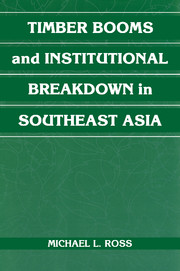Crossref Citations
This Book has been
cited by the following publications. This list is generated based on data provided by Crossref.
Bulte, Erwin H.
and
Barbier, Edward B.
2001.
Biodiversity Economics.
p.
201.
De Lopez, Thanakvaro Thyl
2002.
Natural Resource Exploitation in Cambodia: An Examination of Use, Appropriation, and Exclusion.
The Journal of Environment & Development,
Vol. 11,
Issue. 4,
p.
355.
Brechin, Steven R.
Wilshusen, Peter R.
Fortwangler, Crystal L.
and
West, Patrick C.
2002.
Beyond the Square Wheel: Toward a More Comprehensive Understanding of Biodiversity Conservation as Social and Political Process.
Society & Natural Resources,
Vol. 15,
Issue. 1,
p.
41.
Lim, Linda Y.C.
and
Stern, Aaron
2002.
State Power and Private Profit: the political economy of corruption in Southeast Asia.
Asian-Pacific Economic Literature,
Vol. 16,
Issue. 2,
p.
18.
Mitchell, Ronald B.
2003.
INTERNATIONALENVIRONMENTALAGREEMENTS: A Survey of Their Features, Formation, and Effects.
Annual Review of Environment and Resources,
Vol. 28,
Issue. 1,
p.
429.
Dufournaud, Christian M
Jerrett, Michael
Rodriguez, U-Primo
Quinn, John T
and
Inocencio, Arlene
2003.
The Net Cost of Banning Commercial Foresting: A Computable General Equilibrium Analysis for the Philippines.
Environment and Planning A: Economy and Space,
Vol. 35,
Issue. 4,
p.
745.
Smouts, Marie-Claude
2003.
Tropical Forests International Jungle.
p.
211.
Barbier, Edward B.
2004.
Explaining Agricultural Land Expansion and Deforestation in Developing Countries.
American Journal of Agricultural Economics,
Vol. 86,
Issue. 5,
p.
1347.
Smith, Benjamin
2004.
Oil Wealth and Regime Survival in the Developing World, 1960–1999.
American Journal of Political Science,
Vol. 48,
Issue. 2,
p.
232.
Bloch, Harry
and
Tang, Sam Hak Kan
2004.
Deep determinants of economic growth: institutions, geography and openness to trade.
Progress in Development Studies,
Vol. 4,
Issue. 3,
p.
245.
Aiken, S. Robert
2004.
Runaway Fires, Smoke‐Haze Pollution, and Unnatural Disasters in Indonesia.
Geographical Review,
Vol. 94,
Issue. 1,
p.
55.
Curran, L. M.
Trigg, S. N.
McDonald, A. K.
Astiani, D.
Hardiono, Y. M.
Siregar, P.
Caniago, I.
and
Kasischke, E.
2004.
Lowland Forest Loss in Protected Areas of Indonesian Borneo.
Science,
Vol. 303,
Issue. 5660,
p.
1000.
LUONG, PAULINE JONES
and
WEINTHAL, ERIKA
2004.
Contra Coercion: Russian Tax Reform, Exogenous Shocks, and Negotiated Institutional Change.
American Political Science Review,
Vol. 98,
Issue. 1,
p.
139.
Bulte, Erwin
Damania, Richard
Gillson, Lindsey
and
Lindsay, Keith
2004.
Space--The Final Frontier for Economists and Elephants.
Science,
Vol. 306,
Issue. 5695,
p.
420.
Bulte, Erwin H
and
Barbier, Edward B
2005.
Trade and Renewable Resources in a Second Best World: An Overview.
Environmental & Resource Economics,
Vol. 30,
Issue. 4,
p.
423.
Smith, Benjamin
2005.
Life of the Party: The Origins of Regime Breakdown and Persistence under Single-Party Rule.
World Politics,
Vol. 57,
Issue. 3,
p.
421.
SATO, Yuri
2005.
OVERVIEW OF THE SEVEN YEARS' EXPERIMENT: WHAT CHANGED AND WHAT MATTERS?.
The Developing Economies,
Vol. 43,
Issue. 1,
p.
3.
Michikazu, Kojima
Hisako, Kiyono
Masafumi, Yokemoto
Arata, Izawa
Haruko, Yamashita
and
Satoshi, Tachibana
2005.
The State of the Environment in Asia.
p.
41.
Campbell, Michael O’Neal
2005.
The impact of small‐scale wood harvesting on neem Azadirachta indica A. Juss stands in the coastal savanna of Ghana.
Area,
Vol. 37,
Issue. 1,
p.
8.
Le Billon, Philippe
2005.
Aid in the Midst of Plenty: Oil Wealth, Misery and Advocacy in Angola.
Disasters,
Vol. 29,
Issue. 1,
p.
1.



